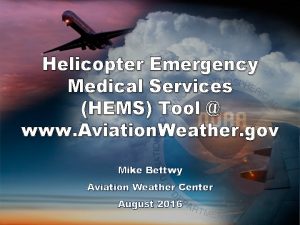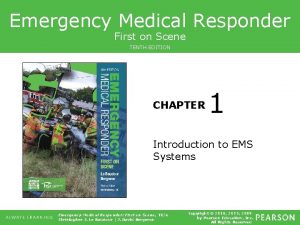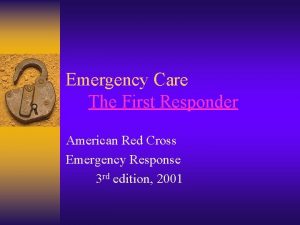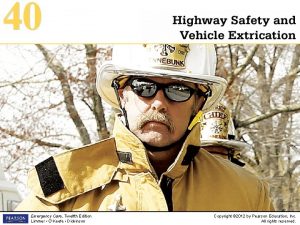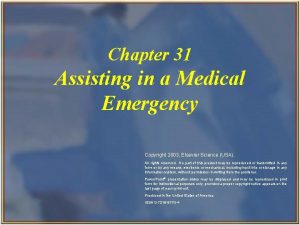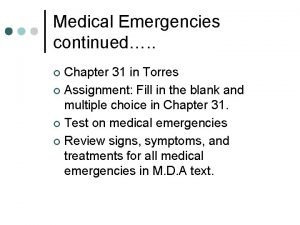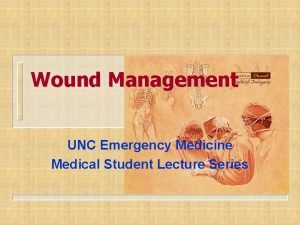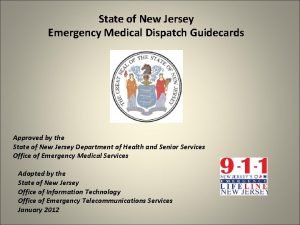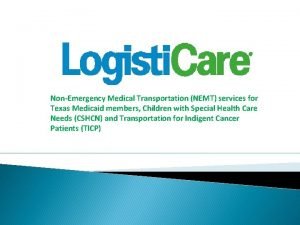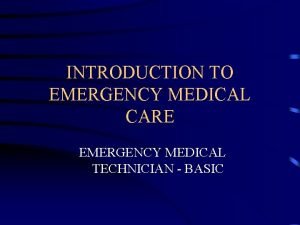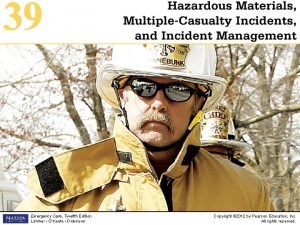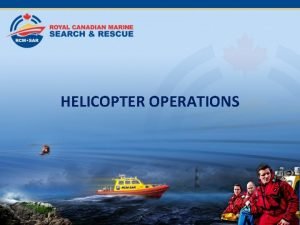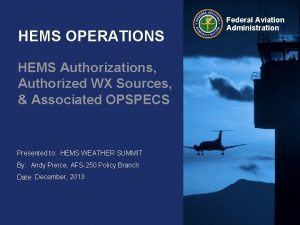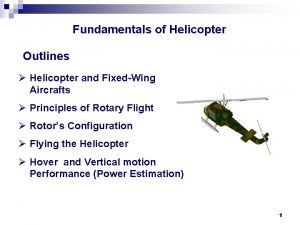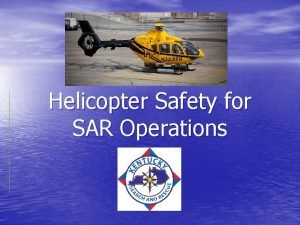Helicopter Emergency Medical Services HEMS HEMS is an










- Slides: 10


Helicopter Emergency Medical Services (HEMS) • HEMS is an air ambulance service • In BC HEMS is provided by the BC Ambulance Service (BCAS) – the sole provider of ambulance services in BC, mandated under the Emergency Health Services Act • In BC HEMS is used mainly to transport critically ill people between medical facilities • It also responds to incidents where air transport versus ground, is needed.

FINDINGS OBSERVATIONS: A. Faster care means lower overall healthcare costs. • The more quickly an accident victim can access care, the better the medical outcome and the shorter the time needed for rehabilitation • Timelier treatment could result in overall savings to the healthcare system B. There are no technical, or infrastructure barriers to the delivery of helicopter emergency medical services within that critical first hour to each and every resident of BC, regardless of where they live. The decision by government not to provide those services is a choice.

FINDINGS OBSERVATIONS: C. The Urban Rural Divide • If you live in rural BC you will not receive the same level of medical emergency response as someone in an urban centre • As the distance to the nearest medical facility increases, in remote communities the access to HEMS should be enhanced, not reduced

FINDINGS OBSERVATIONS: D. Emergency medical transportation is a government responsibility • Industry plays a role in ensuring emergency plans are in place but true confidence in the ability to access HEMS for industries or the public can only come from having a publicly funded dedicated resource available within a region

FINDINGS OBSERVATIONS: E. Protocols for dispatching air or ground ambulance may not work as well in rural BC as in urban centres • The more remote the region the broader the criteria should be for dispatching HEMS over ground ambulance • Distance to medical facilities, time and patient comfort should be equals in dispatch decisions

FINDINGS RECOMMENDATIONS: 1. BC consider mandating – through legislation or policy guaranteed timelines for the public to be able to access Trauma 3 level care, similar to other jurisdictions. a. Establishing guaranteed timelines will direct BCAS to put in place the necessary assets, protocols and procedures that will ensure a patient focused service delivery model.

FINDINGS RECOMMENDATIONS: 2. BC undertake a review of the effectiveness of the legislation as it pertains to the provincial emergency ambulance service. a. Expand the scope of practice and the role of First Responders in the transportation of accident victims to medical facilities. b. Consider regionalizing some components of ambulance services…. . could be tailored to meet the dynamics of the communities and region being served. BCAS still retain overall oversight c. A patient focused system needs more flexibility, not less.

FINDINGS RECOMMENDATIONS: 3. EMBC and BCAS expand the use of hoisting in the Province of BC. a. Hoisting has some significant advantages over longlining. b. Enables the deployment of medical crews directly to the accident site to prepare a patient for extraction and transportation c. Reduces time for patient to be able to access medical care – improving outcomes d. With additional training could be performed by either BCAS personnel or First Responders

Questions & Discussion
 Helicopter hems tool
Helicopter hems tool Emergency medical responder: first on scene
Emergency medical responder: first on scene Red cross emergency medical responder
Red cross emergency medical responder Introduction to emergency medical care
Introduction to emergency medical care Chapter 31 assisting in a medical emergency
Chapter 31 assisting in a medical emergency Define medical emergency chapter 31
Define medical emergency chapter 31 Medical emergency student lectures
Medical emergency student lectures Emd guidecards
Emd guidecards Logisticare dallas
Logisticare dallas Introduction to emergency medical care
Introduction to emergency medical care Medical
Medical
